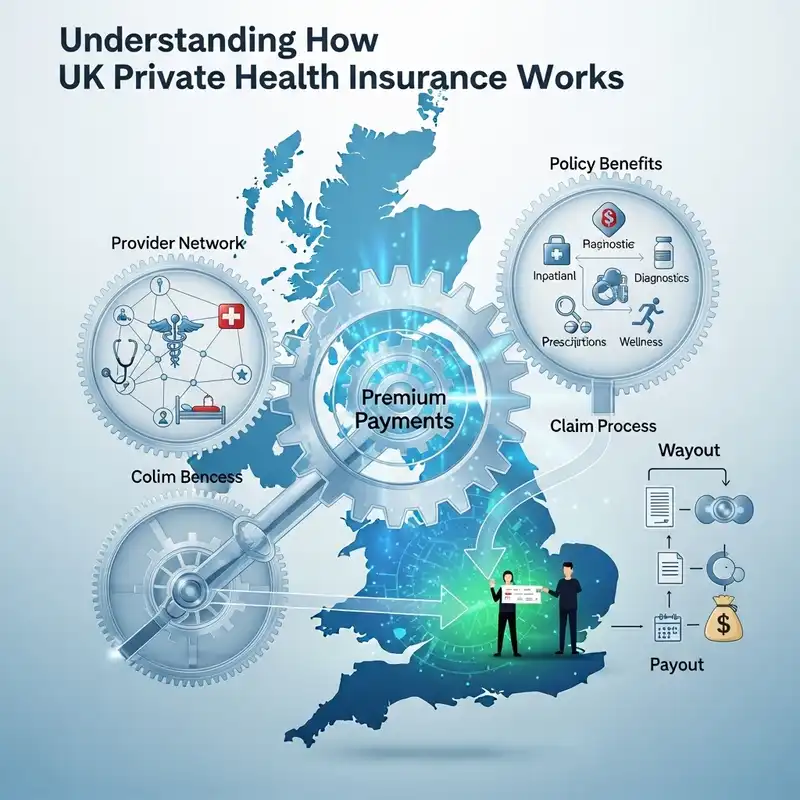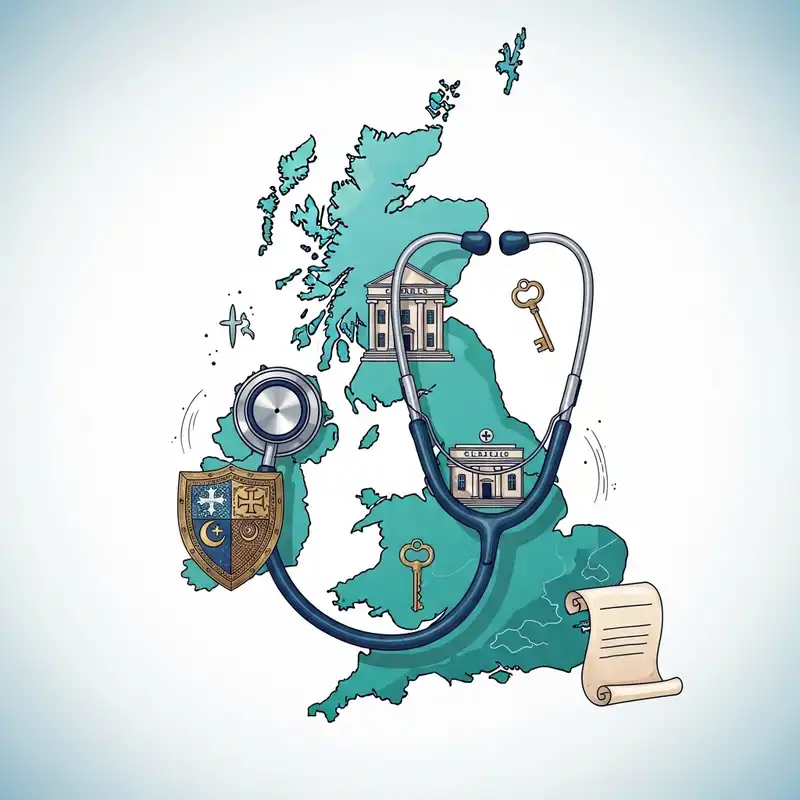Key takeaways
- Conduct an Honest Financial Health Check: Sit down and map it out. What is your income? What are your essential monthly outgoings (mortgage/rent, utilities, food, debt repayments)? How much do you have in savings? Where are the points of failure if your income stopped tomorrow?
- Define Your 'Why': This is the most important step. What, and who, are you protecting? Is it your family's home? Your children's future? Your business's survival? Your own peace of mind and ability to recover from illness without stress? Your 'why' will determine the types and levels of cover you need.
- Audit Your Existing Cover: Check what, if any, protection you have through your employer. 'Death in service' benefits are common, but are typically only a multiple of your salary and disappear if you change jobs. Sick pay schemes vary wildly. Understand the gaps between what you have and what you actually need.
- Seek Expert, Independent Guidance: Trying to navigate the insurance market alone is like trying to perform your own surgery. The terminology is complex, and the consequences of getting it wrong are severe. An expert broker like WeCovr does the heavy lifting for you. We take the time to understand your personal, family, and business circumstances, then search the entire market to find the most suitable and cost-effective solutions to build your bespoke shield.
- Commit to Proactive Wellness: Insurance is your shield, but a healthy lifestyle is your armour. The two work in tandem.
Beyond Self Help Your True Growth Foundation
In a world saturated with self-help books, productivity hacks, and mindfulness apps, the pursuit of personal growth has become a modern-day quest. We chase promotions, bigger goals, and deeper relationships, believing that forward momentum is the only path to fulfilment. But what if the most significant step towards genuine, lasting growth isn't about looking forward, but about securing the ground beneath your feet?
The uncomfortable truth is that a life built on ambition without a safety net is a house of cards. One gust of wind—a sudden illness, an unexpected accident, a family tragedy—can bring it all tumbling down. The stress of financial instability doesn't just halt your progress; it erodes your wellbeing, strains your relationships, and makes true self-development impossible.
This is not about pessimism; it's about profound realism. As we head into 2025, the statistics paint a stark picture. Esteemed sources like Cancer Research UK predict that 1 in 2 people in the UK will be diagnosed with cancer in their lifetime. This isn't a distant possibility; it's a statistical probability that will touch almost every family. (illustrative estimate)
The secret to a life of authentic growth, therefore, lies in building an unbreakable foundation of financial and health security. It’s about strategically using tools like Income Protection, Critical Illness Cover, and Life Insurance not as a grudge purchase, but as the very bedrock upon which you can confidently build your dreams. This is your true growth foundation.
The Modern Maslow's Hierarchy: Why Security is Non-Negotiable
You may remember Maslow's Hierarchy of Needs from a long-forgotten psychology class. It's a simple pyramid that illustrates human motivation. At the bottom are our most basic needs: food, water, and shelter. Just above that is the need for safety and security. Only when these foundational layers are solid can we begin to climb towards higher needs like love, belonging, self-esteem, and finally, self-actualisation—the pinnacle of personal growth and fulfilling one's potential.
In the 21st century, 'safety and security' translates directly to financial stability. Consider these scenarios:
- How can you focus on being a present and engaged partner when you're secretly terrified of how you'd pay the mortgage if you lost your income?
- How can you pursue a creative passion or a business idea when you have no buffer to protect you from an unexpected illness?
- How can you foster unshakeable relationships when a health crisis could plunge your family into financial chaos and emotional turmoil?
The constant, low-level hum of financial anxiety is a direct barrier to growth. It saps your cognitive resources, triggers your stress response, and keeps you in survival mode. You cannot thrive when you are merely trying to survive. Building a comprehensive protection plan is the act of satisfying this fundamental need for security, freeing up your mental and emotional energy to focus on what truly matters.
You wouldn't build your dream home on a foundation of sand. Your life, your relationships, and your ambitions deserve a foundation of solid rock.
Deconstructing Your Financial Safety Net: A Guide to the Essential Tools
Building this foundation isn't about a single product; it's about creating a layered, bespoke shield that covers you from multiple angles. Each type of protection insurance serves a unique purpose, and understanding how they work together is key.
Income Protection: Your Monthly Salary Lifeline
Perhaps the most crucial, yet often overlooked, form of protection.
- What it is: Income Protection Insurance pays you a regular, tax-free monthly income if you are unable to work due to any illness or injury. It's designed to replace a significant portion of your lost earnings, typically 50-70%.
- Who it's for: Every single working adult. If your lifestyle depends on your monthly paycheque, you need this. It is especially vital for the self-employed and freelancers who have no access to employer sick pay schemes.
- How it works: Imagine you're an IT consultant earning £4,000 a month. You suffer a back injury and are signed off work for nine months. After a pre-agreed waiting period (e.g., three months), your Income Protection policy starts paying you, for instance, £2,500 every month until you are fit to return to work. This covers your mortgage, bills, and groceries, removing the financial panic from a health crisis.
The state alternative, Statutory Sick Pay (SSP), is currently £116.75 per week (2024/25 rate) and is only payable for a maximum of 28 weeks. For most, this is simply not enough to survive on. (illustrative estimate)
| Support System | Typical Monthly Payout (on a £4,000 salary) | Maximum Duration |
|---|---|---|
| Statutory Sick Pay (SSP) | Approx. £506 | 28 Weeks |
| Income Protection | £2,000 - £2,800 | Potentially until retirement age |
The difference is stark. Income Protection is the barrier standing between a temporary health issue and a long-term financial disaster.
Life and Critical Illness Cover: The Dual Shield Against Life's Biggest Shocks
This is the cover most people think of, but its power is often underestimated. It’s typically sold as a combined policy but can be bought separately.
-
Life Cover: This pays out a lump sum (or a regular income, which we'll cover next) if you pass away during the term of the policy. Its purpose is to clear debts like a mortgage, provide for your children's future education, and replace your lost income for your family, ensuring they are not left with a financial burden during a time of immense grief.
-
Critical Illness Cover (CIC): This pays out a tax-free lump sum if you are diagnosed with one of a list of predefined serious illnesses, such as cancer, heart attack, or stroke. Crucially, you do not have to die to receive the money. This is insurance for the living.
With the sobering reality that 1 in 2 of us will face a cancer diagnosis, the role of CIC becomes crystal clear. A payout could allow you to: (illustrative estimate)
- Clear or reduce your mortgage, removing the biggest monthly outgoing.
- Adapt your home for new mobility needs.
- Pay for private treatment or specialist care not available on the NHS.
- Allow your partner to take time off work to support you.
- Simply provide a financial cushion so you can focus 100% on your recovery, not your bank balance.
This is not just financial planning; it's a profound act of love for your family and yourself. It provides peace of mind, which is the fertile ground for healing and recovery.
Family Income Benefit: A Smarter Approach for Young Families
While a large lump sum from traditional life cover sounds appealing, it can be daunting for a grieving partner to manage. Family Income Benefit offers a more intuitive solution.
- What it is: Instead of a single lump sum, this type of life cover pays out a regular, tax-free monthly or annual income from the point of claim until the end of the policy term.
- Who it's for: It’s particularly well-suited for families with young children. The goal is to replace the deceased parent's monthly income, providing stability until the children are financially independent.
- How it works: You take out a 20-year policy to provide £2,000 a month. If you were to pass away five years into the policy, it would pay your family £2,000 every month for the remaining 15 years. This predictability makes budgeting during a difficult time far simpler and less stressful. It's often more affordable than an equivalent lump-sum policy.
Personal Sick Pay: The Essential Cover for Hands-On Professionals
Some professions carry a higher day-to-day risk of injury or short-term sickness. Standard Income Protection with a long deferment period might not be suitable for someone who can't afford to be without an income for even a few weeks.
- What it is: A form of short-term income protection, often with a waiting period as short as one day or one week. It's designed to cover immediate loss of earnings from accidents and sickness.
- Who it's for: Tradespeople like electricians, plumbers, and builders; healthcare professionals like nurses and dentists; and anyone in a physically demanding role.
- How it works: An electrician falls from a ladder and breaks their wrist, leaving them unable to work for six weeks. A Personal Sick Pay policy with a one-week waiting period could start paying them a weekly benefit from the second week, ensuring their personal bills are paid while they recover. It bridges the gap before they are back on their feet, preventing them from having to dip into savings or go into debt.
Private Health Insurance (PMI): Your Fast-Track to Diagnosis and Treatment
The NHS is a national treasure, but it is under immense pressure. As of early 2025, waiting lists for consultations and procedures remain a significant concern for millions. This is where PMI becomes an invaluable part of your health and wellness foundation.
- What it is: Private Medical Insurance pays for the cost of private healthcare, from diagnosis through to treatment. It works alongside the NHS, offering you a choice and, crucially, speed.
- Who it's for: Anyone who wants to minimise the time spent waiting for medical care and gain more control over their health journey.
- How it works: You develop a persistent joint pain. Instead of a months-long wait for an NHS specialist appointment, your GP refers you to a private consultant through your PMI policy. You could be seen within days, have an MRI scan the following week, and be scheduled for treatment shortly after.
This speed is not a luxury; it's a vital component of personal and professional stability. Less time waiting and worrying means:
- A quicker return to health and work.
- Reduced mental strain on you and your family.
- More time and energy to dedicate to your career, your relationships, and your personal growth.
Navigating the multitude of protection options can be complex. This is where an expert broker becomes a crucial ally. Here at WeCovr, we don't just sell policies; we help you understand your unique vulnerabilities and build a cohesive protection strategy. We compare plans from all major UK insurers to find the right combination of cover that fits your life and your budget.
At WeCovr, we also believe that proactive health is the first line of defence. That's why we go a step further, providing our clients with complimentary access to CalorieHero, our proprietary AI-powered calorie and nutrition tracking app. It's a small way we support your wellness journey every single day, reinforcing the link between good health and a secure future.
For the Leaders and Innovators: Protecting Your Business and Legacy
If you are a company director, business owner, or freelancer, your personal and professional finances are deeply intertwined. Protecting one means protecting the other. Standard personal policies are essential, but specialist business protection is what secures your enterprise.
Key Person Insurance: The Business Lifesaver
- What it is: A business-owned insurance policy taken out on the life of a crucial employee—a founder, a top salesperson, a technical genius—whose death or critical illness would have a devastating financial impact on the company.
- Why it's vital: The policy pays a lump sum to the business. This money can be used to:
- Recruit and train a replacement.
- Cover the resulting loss of profits or turnover.
- Reassure lenders, investors, and clients that the business remains stable.
- Clear business loans that the key person may have personally guaranteed.
- Example: A successful design agency is built around its charismatic and talented creative director. If she were to suffer a major stroke, the agency could lose its biggest clients overnight. A Key Person policy would provide the cash injection needed to hire a top-tier freelance director and manage the transition, saving the business from collapse.
Executive Income Protection: Rewarding and Retaining Your Top Talent
- What it is: A premium form of Income Protection that is paid for by the company, for the benefit of a director or key employee.
- The benefits: For the business, the premiums are typically classed as an allowable business expense, making it a tax-efficient way to offer a high-value benefit. For the employee, it provides a superior level of cover than a personal plan might, acting as a powerful tool for recruitment and retention. It shows you truly value your team's wellbeing.
Gift Inter Vivos & Inheritance Tax Planning: Securing Your Legacy
True financial security extends beyond your own lifetime. It's about ensuring the wealth you've built passes efficiently to the people you love.
- What it is: Inheritance Tax (IHT) is a complex area. When you give away a significant asset (cash, property) as a gift, it is known as a 'Potentially Exempt Transfer'. If you survive for seven years after making the gift, it becomes fully exempt from IHT. However, if you die within that seven-year window, the gift becomes part of your estate and could be liable for a 40% tax bill. A Gift Inter Vivos policy is a specialised life insurance plan designed to pay out a lump sum to cover this potential tax liability.
- Why it matters (illustrative): Imagine gifting your children £100,000 towards a house deposit. If you were to pass away four years later, they could face a significant IHT bill on that gift. This policy ensures your gift arrives intact, protecting your loved ones from an unexpected tax burden and preserving the integrity of your legacy. It’s the ultimate act of protecting a relationship, even after you’re gone.
Building Your Foundation in 2025: A Practical Action Plan
Feeling overwhelmed? Don't be. Building your foundation is a methodical process. Here’s how to start.
- Conduct an Honest Financial Health Check: Sit down and map it out. What is your income? What are your essential monthly outgoings (mortgage/rent, utilities, food, debt repayments)? How much do you have in savings? Where are the points of failure if your income stopped tomorrow?
- Define Your 'Why': This is the most important step. What, and who, are you protecting? Is it your family's home? Your children's future? Your business's survival? Your own peace of mind and ability to recover from illness without stress? Your 'why' will determine the types and levels of cover you need.
- Audit Your Existing Cover: Check what, if any, protection you have through your employer. 'Death in service' benefits are common, but are typically only a multiple of your salary and disappear if you change jobs. Sick pay schemes vary wildly. Understand the gaps between what you have and what you actually need.
- Seek Expert, Independent Guidance: Trying to navigate the insurance market alone is like trying to perform your own surgery. The terminology is complex, and the consequences of getting it wrong are severe. An expert broker like WeCovr does the heavy lifting for you. We take the time to understand your personal, family, and business circumstances, then search the entire market to find the most suitable and cost-effective solutions to build your bespoke shield.
- Commit to Proactive Wellness: Insurance is your shield, but a healthy lifestyle is your armour. The two work in tandem.
- Nutrition: Focus on a balanced diet rich in whole foods. Small, consistent changes have a huge impact.
- Movement: Aim for regular physical activity that you enjoy. It’s as much for your mental resilience as it is for your physical health.
- Sleep: Prioritise 7-9 hours of quality sleep per night. It is fundamental to cognitive function, emotional regulation, and immune response.
- Stress Management: Incorporate mindfulness, hobbies, or simple breathing exercises into your day. Managing chronic stress is a powerful preventative health measure.
Summary: Choosing Your Protection Portfolio
This table provides a simple overview to help you see how the different products fit together.
| Product Name | What It Protects | Best For... | Key Feature |
|---|---|---|---|
| Income Protection | Your monthly income | Every working adult, especially self-employed | Replaces your salary if you can't work |
| Critical Illness Cover | Your financial stability during major illness | Everyone, given the 1-in-2 cancer statistic | Tax-free lump sum on diagnosis |
| Life Cover (Lump Sum) | Your family's financial future after you're gone | Those with mortgages, debts, and dependents | Clears large debts and provides a legacy |
| Family Income Benefit | Your family's ongoing lifestyle | Parents with young children | Provides a regular, manageable monthly income |
| Personal Sick Pay | Your short-term earnings | Tradespeople, nurses, manual workers | Quick payout for accidents and sickness |
| Private Health Insurance | Your time and access to healthcare | Anyone wanting to bypass long waiting lists | Fast access to specialists and treatment |
| Key Person Insurance | Your business's survival and continuity | Business owners and directors | Protects the business from loss of key staff |
| Gift Inter Vivos Cover | Your financial gifts to loved ones | Individuals planning their estate | Covers potential Inheritance Tax liability |
Conclusion: The Unshakeable Foundation for a Life Well-Lived
The relentless pursuit of 'more'—more success, more experiences, more growth—can leave us feeling exposed and fragile. The great paradox of personal development is that the ability to soar is granted only to those who have secured their landing.
In 2025 and beyond, building this security is not an optional extra; it is the essential first step. It is the most profound act of self-care you can undertake and the most meaningful way to protect the relationships you cherish. By strategically layering products like Income Protection, Critical Illness Cover, and Life Insurance, you are not planning for an ending. You are building the unbreakable foundation for a magnificent beginning. You are giving yourself and your loved ones the ultimate gift: the freedom to pursue dreams, face the future with confidence, and live a life defined not by fear, but by possibility.
Is protection insurance expensive?
Do I need protection if I'm single with no dependents?
What's the difference between Income Protection and Critical Illness Cover?
How does my health and lifestyle affect my premiums?
Why should I use a broker like WeCovr instead of going direct to an insurer?
Sources
- Office for National Statistics (ONS): Mortality and population data.
- Association of British Insurers (ABI): Life and protection market publications.
- MoneyHelper (MaPS): Consumer guidance on life insurance.
- NHS: Health information and screening guidance.































